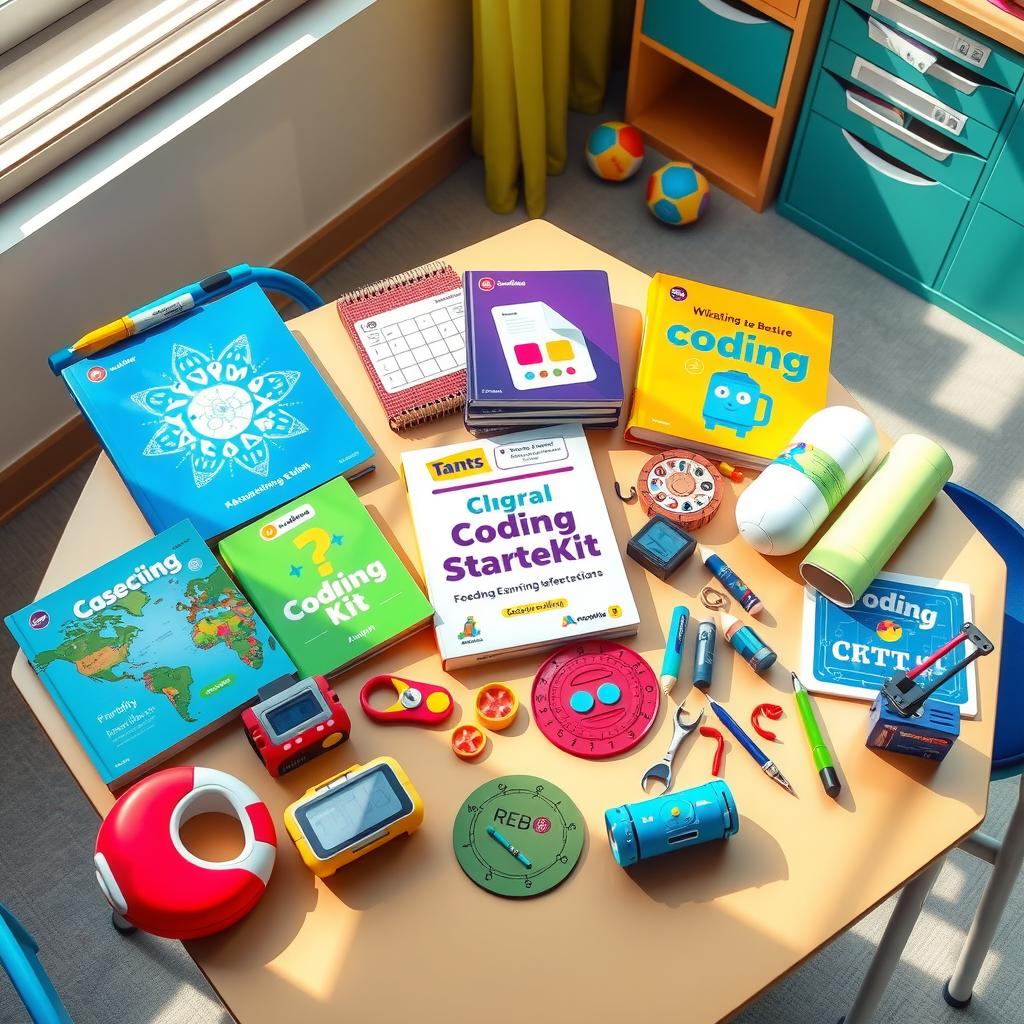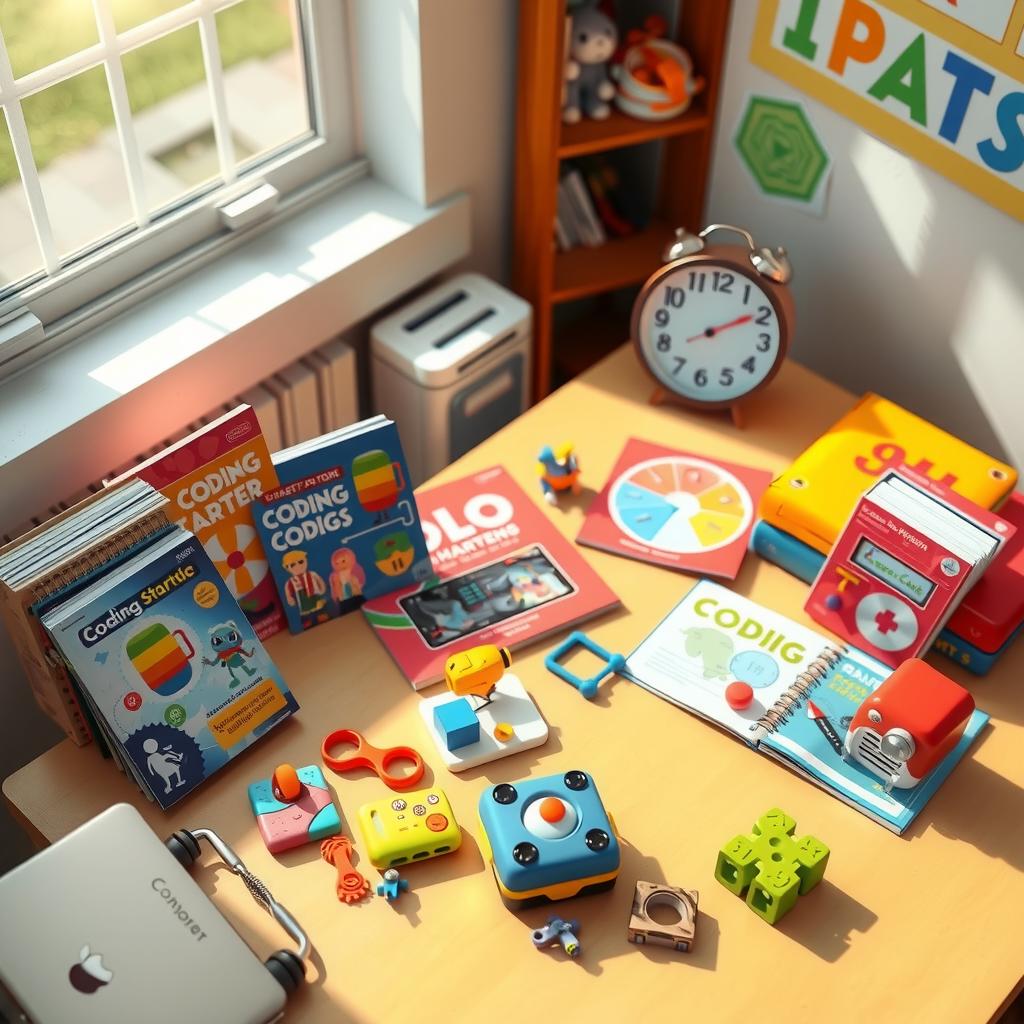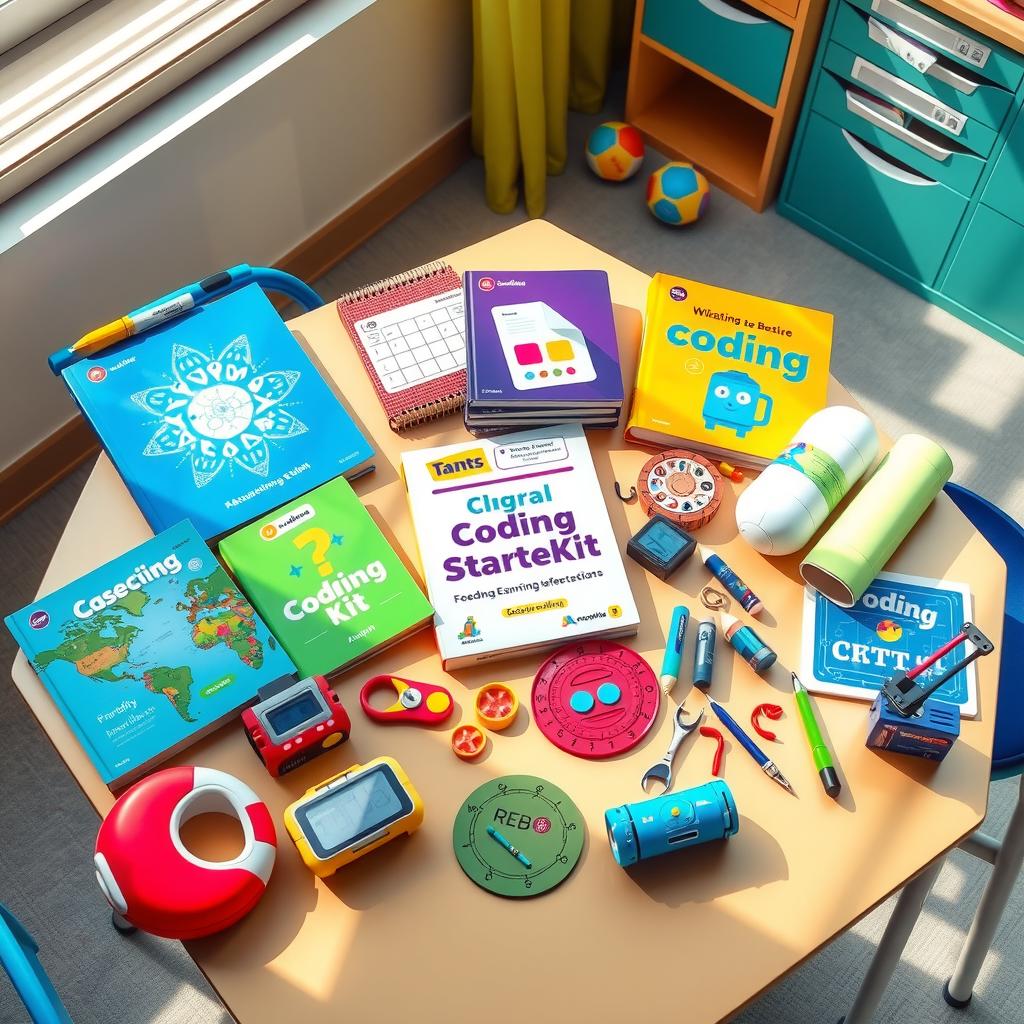In an increasingly digital world, the demand for technology skills has never been greater, and this trend starts at a young age. Elementary students today are growing up surrounded by technology and need to develop essential programming basics that will not only enhance their academic journey but also prepare them for future careers in STEM fields. However, many parents and educators face the challenge of introducing coding concepts in a way that is engaging and accessible for children. This is where a well-designed coding starter kit comes into play, serving as an invaluable resource that simplifies the learning process while igniting curiosity.
The core value of introducing a coding starter kit lies in its ability to transform abstract programming ideas into tangible experiences through interactive projects. By offering beginner coding resources tailored specifically for young learners, these kits provide hands-on opportunities to understand how computer science works without overwhelming them with technical jargon or complex theories. Moreover, they foster creativity and problem-solving skills—two critical components of effective learning—while enabling children to grasp fundamental coding principles at their own pace.
As schools increasingly incorporate computer science education into their curriculums, equipping young minds with the right tools becomes paramount. A thoughtfully curated coding starter kit can bridge the gap between traditional learning methods and modern educational needs by making elementary coding both fun and informative. Parents looking to supplement classroom instruction or simply introduce their kids to programming will find these kits particularly beneficial.
This article aims to explore various aspects of utilizing a coding starter kit effectively within elementary education settings. From understanding key features that appeal to children’s interests to recognizing how such resources contribute significantly towards fostering STEM education from an early age, readers will gain insights on optimizing their approach toward teaching coding for kids. By incorporating playful elements alongside foundational knowledge in programming basics, educators can create enriching environments where students learn not just how to code but also why it matters in our tech-driven society.
Dive deeper into this guide as we unravel tips on selecting the right coding starter kit, ensuring every child embarks on an exciting journey of learning to code—a journey filled with endless possibilities!

Key Points:
-
Interactive Learning Tools: The inclusion of engaging activities within the coding starter kit allows elementary students to grasp programming basics effortlessly. Through hands-on experiences, children can explore coding for kids in a playful manner, transforming abstract concepts into fun tasks. This approach not only simplifies complex ideas but also encourages young learners to develop critical thinking skills crucial for their academic journey.
-
Foundational Skills in STEM Education: By utilizing a well-structured coding kit, parents and educators can ignite curiosity in STEM education among elementary-age children. These resources are designed specifically with beginners in mind, ensuring that as students learn to code, they build a solid foundation for future success in computer science for children. The gradual progression from simple challenges to more intricate projects fosters confidence and cultivates a lifelong love of learning about technology.
-
Real-World Applications of Coding: Engaging with beginner coding resources found within the coding starter kit helps students understand how programming principles apply to everyday scenarios. As they tackle interactive challenges and create their own projects, these young minds will recognize how coding interplays with various aspects of life—transforming theoretical knowledge into tangible results while enhancing their problem-solving abilities through fun learning experiences.

The Rise of Coding Skills in Modern Education
Building a Foundation for the Future
In today’s technology-driven world, the significance of coding skills cannot be overstated. As industries increasingly rely on digital solutions, equipping children with programming basics from an early age has become essential. Early exposure to coding not only fosters critical thinking and problem-solving abilities but also prepares young learners for a workforce that is rapidly evolving due to technological advancements. This foundational knowledge equips them with tools necessary for success in various fields including science, technology, engineering, and mathematics (STEM). By incorporating resources such as a coding starter kit, educators can effectively introduce elementary coding concepts in engaging ways.
A coding starter kit serves as an excellent beginner resource by providing hands-on experiences that demystify complex programming languages and principles. These kits often include interactive elements designed specifically for kids, making learning both fun and effective. For instance, through simple projects included in these kits, students learn how to create basic programs while gaining confidence in their ability to manipulate technology creatively. Notably, this approach aligns perfectly with current educational trends advocating for STEM education at all levels—highlighting its importance not just within traditional computer science classes but across the curriculum.
Furthermore, early engagement with learning to code helps cultivate an interest in computer science among children who might otherwise overlook this crucial area of study. Research shows that when children interact with technology through structured play using a coding starter kit, they develop essential skills such as logical reasoning and persistence—traits invaluable not only in programming but also throughout life’s challenges. As parents and educators recognize the value of these skills amidst rising job demands across tech sectors worldwide, investing time into initiatives promoting coding for kids becomes imperative.
Moreover, integrating beginner coding resources into after-school programs or summer camps further enhances accessibility to vital learning opportunities outside standard classroom settings. Programs utilizing these tools can cater to diverse groups of students regardless of their prior exposure or experience level; they provide flexible pathways towards understanding intricate programming ideas without overwhelming young minds.
The necessity for comprehensive education strategies addressing digital literacy underscores why initiatives centered around elementary coding are paramount today more than ever before. In doing so through thoughtful implementation of products like a coding starter kit, stakeholders empower future generations equipped with relevant skill sets necessary not just to thrive academically but ultimately contribute meaningfully within society’s growing tech-centric landscape—a goal well worth pursuing collectively.
Essential Elements of a Coding Starter Kit
Engaging Resources for Young Learners
A coding starter kit is an invaluable resource designed to introduce children to the world of programming in a fun and engaging way. This kit typically includes a variety of hands-on projects that not only teach the basics of coding but also foster creativity and problem-solving skills. Among its key components are interactive games, colorful activity books, and user-friendly software that simplify complex concepts into digestible lessons suitable for young minds. For instance, visual programming tools allow kids to drag-and-drop code blocks, making learning less intimidating while enhancing their understanding of fundamental programming principles. Such activities aim to ignite curiosity about computer science for children, transforming what might seem like daunting subjects into exciting challenges.
Practical Projects That Spark Interest
One significant advantage of incorporating practical projects within the coding starter kit is their ability to captivate children’s attention while solidifying their knowledge base in programming basics. These projects often involve building simple applications or games that resonate with children’s interests—whether they enjoy storytelling, animation, or robotics. By working on real-world problems through these creative endeavors, learners can directly see the impact of their efforts; this approach not only boosts confidence but also encourages persistence when faced with challenges. Ultimately, such project-based learning reinforces essential STEM education principles by bridging theoretical concepts with tangible outcomes.
Tools That Enhance Learning Experience
In addition to engaging activities and project work, many coding starter kits come equipped with various tools designed specifically for beginner coders. These may include tablets preloaded with educational apps or coding robots controlled via basic commands that promote hands-on interaction with technology. The inclusion of multimedia resources—like video tutorials and online forums—serves as supplementary material that helps children navigate through initial hurdles in learning to code. As young learners tackle each new challenge presented by these tools, they gradually build up their skills at a comfortable pace while enjoying every step along the way.
Community Support Through Collaborative Learning
Another vital aspect integrated into effective coding starter kits is community support through collaborative learning opportunities. Many kits encourage participation in local coding clubs or online platforms where peers can connect over shared coding experiences. This social element promotes teamwork as well as healthy competition among aspiring programmers who can exchange ideas and solutions openly—a crucial skill set applicable beyond just programming contexts. By fostering connections between learners from diverse backgrounds who share common goals related to beginner coding resources, these communities further enhance engagement levels during critical early stages in developing computer literacy.
Conclusion: A Gateway Into Future Opportunities
Ultimately, investing time in a thoughtfully crafted coding starter kit serves as an excellent gateway into future opportunities within technology fields for young learners today—an era defined increasingly by digital innovation. As more educators emphasize elementary coding curriculum integration across schools worldwide alongside traditional teaching methods focused on rote memorization alone; parents too play an essential role advocating for enriched curricula aimed at cultivating interest amongst youth toward computer science careers long before formal education begins.. With enriching resources intertwined seamlessly throughout such kits coupled alongside supportive networks available widely accessible now than ever before—it becomes clear why embracing this educational trend stands out so prominently amidst ongoing discussions surrounding how best equip our next generation leaders!
Early Exposure to Coding: A Gateway to Success
Enhancing Academic Performance Through Computer Science
Introducing computer science at an early age offers numerous benefits, particularly in fostering creativity and critical thinking among students. When children engage with coding concepts through resources such as the coding starter kit, they not only learn programming basics but also develop essential problem-solving skills that are transferable across various academic subjects. Research has shown that early exposure to coding for kids can significantly enhance their ability to think logically and approach complex problems systematically. This foundational knowledge lays the groundwork for success in STEM education, where analytical thinking is paramount. By incorporating playful yet educational tools like a coding starter kit, young learners can experiment with creating their own projects, which stimulates both imagination and cognitive growth.
Building Problem-Solving Skills Through Programming Basics
As students begin learning to code, they encounter challenges that require them to devise solutions independently or collaboratively. This process of trial and error instills resilience and adaptability—qualities crucial for academic achievement in any discipline. Engaging with beginner coding resources allows children to tackle real-world issues creatively while honing their analytical skills. For instance, when faced with a bug in their program or an unexpected output, young coders learn how to troubleshoot by breaking down the problem into manageable parts—a skill applicable beyond technology into everyday life scenarios. The integration of computer science for children within school curriculums cultivates a mindset geared toward innovation; as they understand the underlying logic of algorithms, students become more adept at strategic thinking across various subjects.
Fostering Creativity Alongside Analytical Thinking
The relationship between creativity and critical thinking becomes especially evident when considering how coding encourages experimentation. Children who delve into programming find themselves inspired by what they can create—from games and animations to apps that solve everyday problems—encouraging them not just to consume content but also produce it actively. Utilizing tools like the coding starter kit enables these budding programmers to visualize abstract concepts through interactive experiences; this hands-on engagement makes learning fun while reinforcing key principles of both computation and design thinking. Furthermore, as these young innovators explore different ways of building their digital creations, they cultivate an openness towards new ideas—a trait fundamental for future leaders across diverse fields.
Preparing Future Innovators With Early Computer Science Education
By integrating computer science education from a young age, educators prepare students for a rapidly evolving technological landscape where digital literacy will be indispensable. The skills gained through elementary coding programs extend far beyond mere technical proficiency; they encompass collaboration abilities developed during group projects or peer reviews typical within coding environments—essential qualities in today’s interconnected world driven by teamwork and communication efficiency. As schools increasingly adopt comprehensive curricula featuring resources such as beginner coding kits, we witness firsthand how these initiatives transform classrooms into vibrant ecosystems nurturing creative thinkers poised for success—not solely within STEM fields but across all domains requiring innovative thought processes.
In today’s technology-driven world, equipping the next generation with essential skills is crucial. One effective way to achieve this is through early exposure to coding, making a coding starter kit an invaluable resource for elementary students. This toolkit introduces young learners to the fundamentals of programming in an engaging manner, ensuring that they experience both creativity and problem-solving while learning to code. By incorporating interactive activities tailored specifically for children, these kits transform complex programming basics into fun and digestible concepts.
The significance of STEM education cannot be emphasized enough during these formative years. A well-structured coding starter kit acts as a catalyst for sparking curiosity among young minds while simultaneously developing critical thinking skills. Parents and educators can utilize this resource not only to simplify intricate ideas but also to provide hands-on experiences that reinforce understanding. As students engage with beginner coding resources within the kit, they find themselves exploring their creativity while grasping essential programming principles in an enjoyable environment.
Introducing kids to computer science for children at a young age lays a strong foundation for future academic achievements. The projects included in the coding starter kit are thoughtfully designed with beginners in mind, guiding them through interactive challenges that balance stimulation without overwhelming them. This gradual progression from simple tasks toward more complex projects builds confidence as students recognize their ability to create games or address real-world problems using code—a journey that fosters a lifelong love of learning about technology.
FAQ:
Q: What age group is suitable for using a coding starter kit?
A: A coding starter kit is designed primarily for elementary-age students, typically ranging from 5 to 12 years old.
Q: How does coding benefit children’s education?
A: Engaging with elementary coding enhances problem-solving abilities and critical thinking skills while introducing fundamental concepts related to STEM education.
Q: Can parents use these kits at home?
A: Yes! The beginner coding resources included in a coding starter kit are perfect for both classroom settings and home use, allowing parents to support their child’s interest in learning to code effectively.



